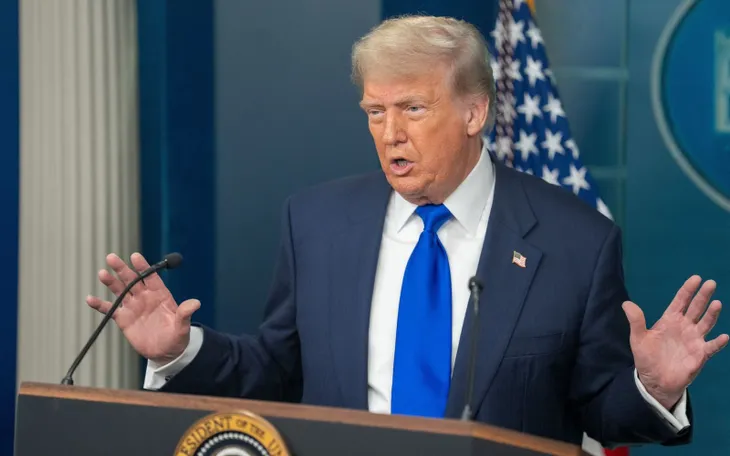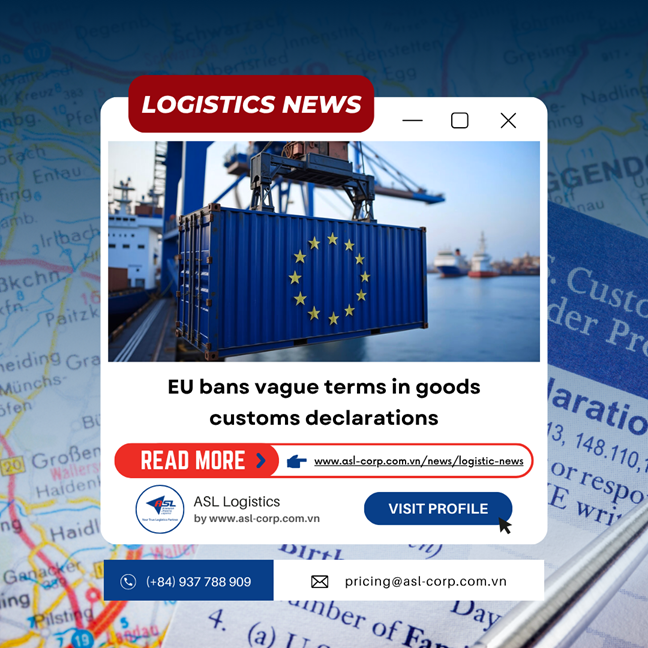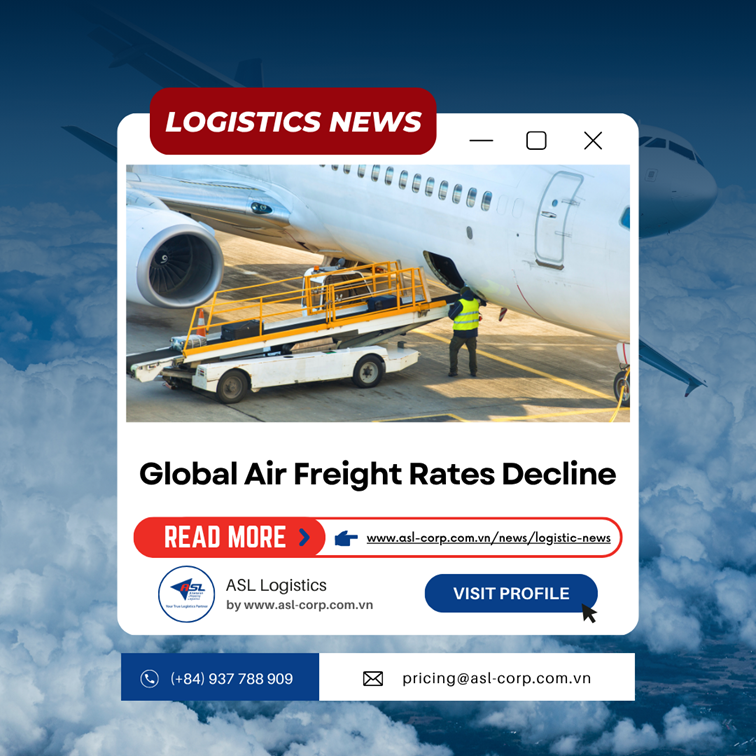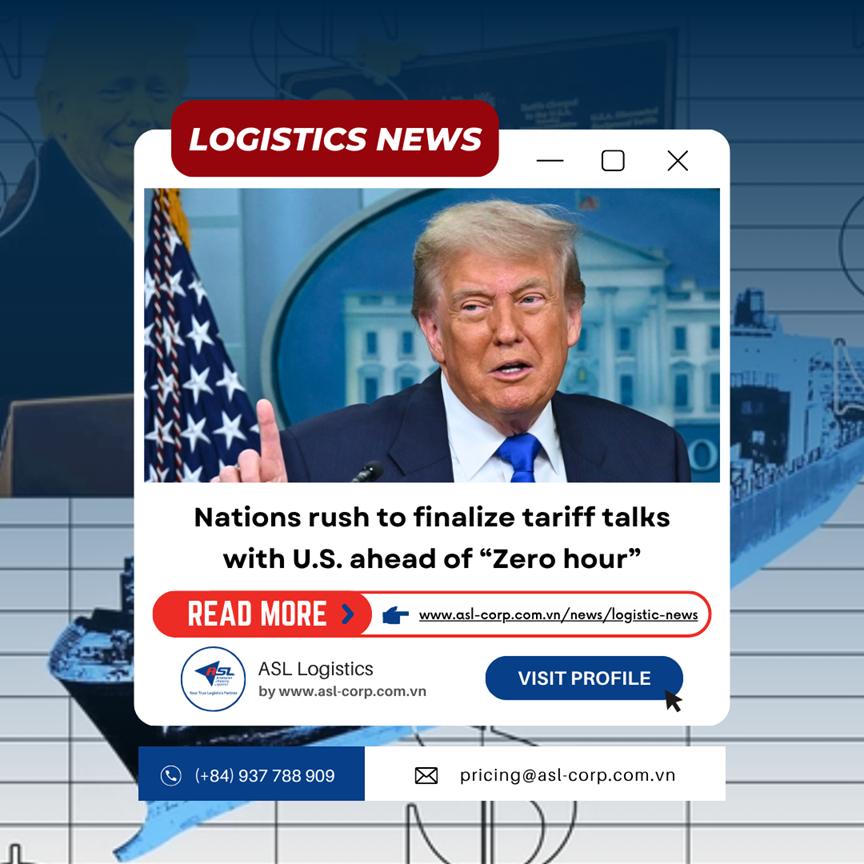Logistic News
U.S. TARIFF PRESSURE MOUNTS — HOW WILL COUNTRIES RESPOND?
17 July 2025
Southeast Asian economies are making efforts to accelerate trade negotiations with Washington after facing high tariffs imposed by the U.S.

Tough Tariff Retaliation Targets ASEAN and Asia
U.S. President Donald Trump has posted nearly identical letters on Truth Social addressed to Japanese Prime Minister Shigeru Ishiba and South Korean President Lee Jae Myung, announcing a "flat 25% tariff" on all imports starting August 1. Trump claimed that economic relations with Tokyo and Seoul had "regrettably never been reciprocal."
"We are willing to continue working with you, but only under conditions of fairer and more balanced trade," he wrote. "We invite you to participate in America’s extraordinary economy, the world’s No.1 market, far ahead of the rest."
Trump also warned that if Japan or South Korea responded with retaliatory tariffs, the U.S. would impose an additional 25%.
In addition, Trump slapped a 25% tariff on goods from Kazakhstan, Malaysia, and Tunisia. Higher tariffs will also apply to imports from South Africa and Bosnia & Herzegovina (30%), Indonesia (32%), Serbia and Bangladesh (35%), Thailand and Cambodia (36%), and Laos and Myanmar (40%).
On July 7, Trump officially notified 14 countries of the new tariffs. This move came just before the 12:01 AM deadline on July 9, the date by which nations needed to reach agreements to avoid the risk of facing even higher tariffs. July 9 also marked the end of a suspension period on reciprocal tariffs that had been in place since April. Since then, affected countries have already been subject to a minimum 10% tariff.
In all 14 letters, Trump warned of further tariff hikes beyond the announced rates if any nation retaliates against the U.S. tariffs. He emphasized that these new tariffs are "separate from any sector-specific duties," meaning, for example, the new tariffs will not stack on top of the existing 25% automotive tariff. This also applies to any potential sector-based duties imposed in the future, according to a White House official.
According to data from the U.S. Department of Commerce, the U.S. imported $465 billion worth of goods from the 14 notified countries last year. Japan and South Korea — America’s sixth and seventh-largest trading partners respectively — accounted for 60% of that total, with $280 billion worth of exports to the U.S. over the past year.
Trump has argued that tariffs help correct unfair trade deficits. However, critics contend the policy will drive up domestic prices and harm the economy. The first round of tariffs was introduced on April 2 under the so-called "Liberation Day" package, including a flat 10% tariff on all imports and higher rates on goods from China, Mexico, Canada, and the EU. Some tariffs were temporarily suspended for 90 days to allow time for negotiations and to avoid a full-blown trade war.
Earlier this month, Trump warned the U.S. would impose tariffs if no agreements were reached. "By the 9th, they will be fully taxed," he told reporters on July 4. "The tariffs will range from 10%, 20%, to potentially 60%, 70%."
Worrying Tariffs, Nations Rush to Revive Talks
Southeast Asia’s largest economies have been preparing to ramp up trade talks with Washington after being hit with steep tariffs, despite a series of last-ditch offers aimed at boosting U.S. imports and reducing duties on American goods.
Countries in the region are among the hardest hit by President Trump’s sweeping tariff measures due to their heavy reliance on exports and manufacturing to drive their $3.8 trillion collective economy — some of which have benefited from supply chain shifts out of China.
Fixed tariff rates, such as the 32% on Indonesia and 36% on Thailand effective August 1, remain in place despite recent efforts to improve proposals, including promises to increase U.S. imports and lift tariffs on many American goods.
The full scope of the tariff measures remains unclear. Malaysia, a major exporter of semiconductors and electronics, now faces a 25% tariff — up from the 24% threatened in April before Trump’s 90-day pause.
Thailand’s Finance Minister Pichai Chunhavajira, who presented new proposals to U.S. officials during his visit to Washington last week, admitted he was "somewhat shocked" by the 36% rate imposed on his country but affirmed Thailand’s readiness to offer more to its largest export market.
"The U.S. has yet to consider our latest proposals," he posted on X. "We will explore additional measures and solutions. Rest assured, we will fight to the end to secure the best possible deal for Thailand," he emphasized.

Consumers shopping at a supermarket in California, U.S. / Photo: THX
Indonesia, Southeast Asia’s largest economy, announced that its top negotiator, Airlangga Hartarto, is en route to Washington from the BRICS summit in Brazil and will immediately hold talks with U.S. officials. “There is still room for negotiations. The Indonesian government is maximizing every opportunity to negotiate,” said Haryo Limanseto, spokesperson for the Coordinating Ministry for Economic Affairs.
Indonesia, a G20 economy, had offered a range of concessions to Washington at the outset of talks, along with proposals to promote investments into the U.S. Recently, the country put forward a series of offers to purchase additional energy, commodities, and aircraft from American companies in a deal potentially worth up to $34 billion. However, these tariffs could still prove costly for the world’s largest palm oil exporter, which supplies around 85% of America’s imported cooking oil.
Hadi Sugeng, Secretary-General of the Indonesian Palm Oil Association, warned that exports to the U.S. could drop by 15%–20% due to the tariffs, causing Indonesia to lose market share to competitor Malaysia and to other types of vegetable oils.
The Thai Rice Exporters Association noted that Thailand — the world’s second-largest rice exporter — could also see a 20% drop in demand from the U.S. market.
One of the few countries to benefit in the region since April 2 is Cambodia, where tariffs were reduced from 49% to 36% after negotiations with the U.S. aimed at protecting its key garment and footwear industries.
Malaysia’s Ministry of International Trade and Industry stated that it is continuing efforts to negotiate and clarify the scope of the tariffs. The ministry emphasized: “Malaysia remains committed to working with the U.S. toward a balanced, mutually beneficial, and comprehensive trade agreement.”
Source: VTV Online

Head Office
ASL Ho Chi Minh
No.31/34A Ung Van Khiem Street, Thanh My Tay Ward, HCMC, Vietnam
 Amerasian Shipping Logistics Corp.
Amerasian Shipping Logistics Corp.
 (+84)28 3512 9759
(+84)28 3512 9759
 (+84)28 3512 9758
(+84)28 3512 9758
 pricing@asl-corp.com.vn
pricing@asl-corp.com.vn
 mdirector@asl-corp.com.vn
mdirector@asl-corp.com.vn
 www.asl-corp.com.vn
www.asl-corp.com.vn












.png)

.png)



